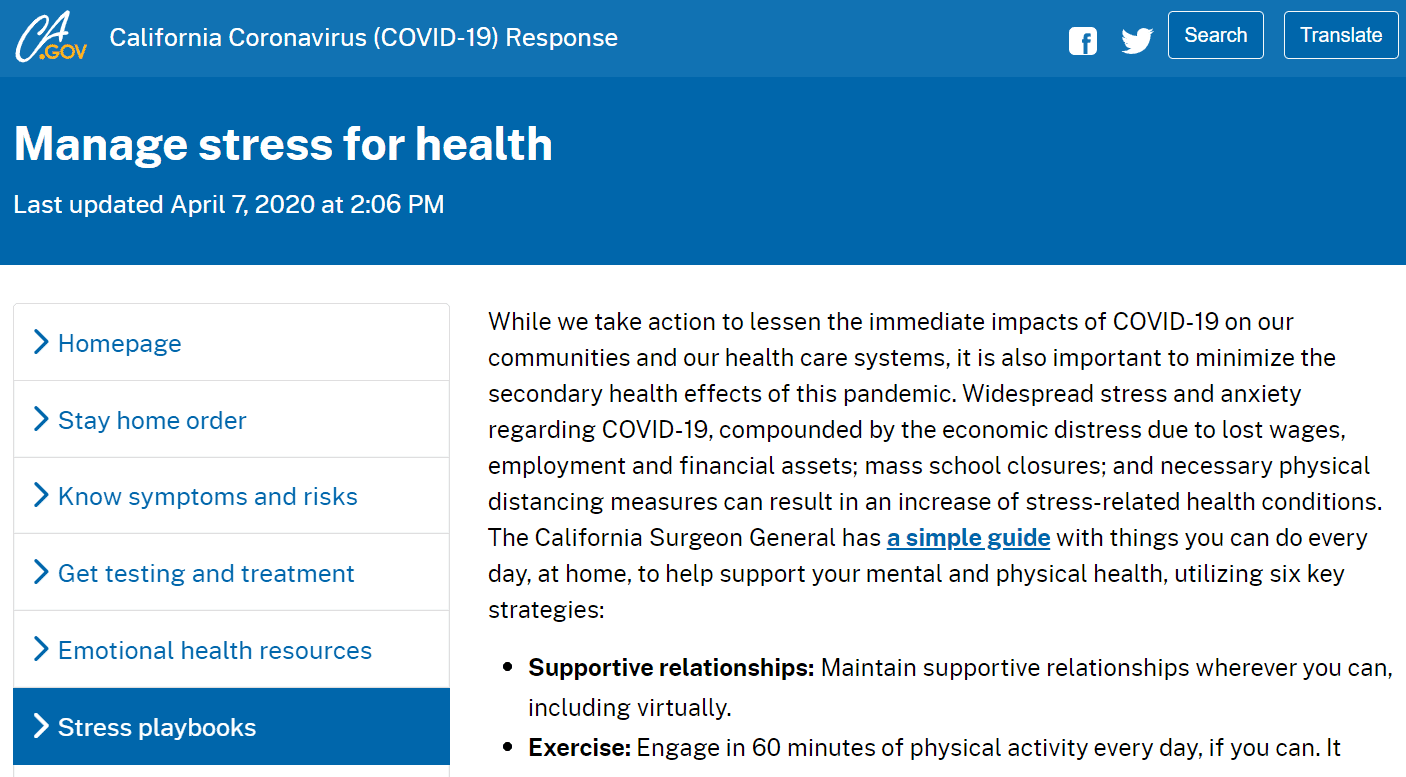Life is full of stressful situations. Frontline health workers, such as community health workers or promotores, are used to supporting clients as they juggle health issues along with stressors like child care and work. That’s on a good day.
Now think about how clients and patients deal with the outbreak of a crisis like the coronavirus disease 2019 (COVID-19) on top of day-to-day anxieties. This means more people are worried about paying the water bill, eviction, varying family obligations, changes to daily routines, and job instability.
[Download Now: Behavioral Health Resources]
Chronic stress can come from many sources such as poverty, long-term sickness, or domestic violence, in addition to a global pandemic. Stress has a serious effect on a person’s overall wellness. It can increase the risk of heart disease and strokes. It can increase depression, anxiety, and more serious mental illnesses—all associated with heart disease and a lower immune system. Stress can also lead people to unhealthy choices with food and substances.
“It’s now 455 days since my last sip of alcohol, and right now it feels harder than it has done, in over a year,” Yvette Mayer, a leadership coach, said on LinkedIn. “The idea of buffering with a bottle of red wine is appealing. I know I’m very unlikely to be alone in this ‘urge’.”
Supporting clients and patients in controlling stress is critical.
Managing Stress

CHWs might feel helpless when they see clients have difficulty dealing with these anxieties, but they can still help. It’s always an important for CHWs to support clients’ behavioral health. They can do some things like be an active listener, give suggestions for telehealth, and coach healthy living. Here are two:
- Manage stress for health from the California Department of Public Health has some simple tips
- Free Online Sobriety Support During Covid-19 from the Sober Señorita is a great resource to share with clients with alcohol abuse issues
Supervisors of CHWs and program managers should look out for signs of stress and burnout among their staff. These resources are helpful with clients and also internally.
But there are some more serious signs that CHWs need to refer clients to a behavioral health provider who can give more support. Making a referral for a mental illness like depression or severe anxiety is an important step. Mental health disorders, like any chronic disease, can be managed or avoided with early intervention.
10 Signs Someone Needs a Behavioral Health Referral
- Suicidal thoughts
- Trouble concentrating
- Lack of interest
- Restlessness
- Constantly checking news outlets or social media
- Changed sleep patterns
- Fatigue
- Distant or withdrawn
- Mood swings
- Diet changes
These are 10 signs community health workers can look out for if you suspect someone in your community is struggling and needs help:
1. Suicidal thoughts
If someone talks about killing or harming themselves, make a referral right away. Call the 24-hour Suicide Prevention Lifeline at
1-800-273-8255 or text 838255. Not everyone who has suicidal thoughts shows them, but you can certainly notice subtle remarks that may point to trouble.
2. Trouble concentrating
When someone has difficulty concentrating on daily activities, are confused, forget things, has trouble getting anything done, this can be a sign of depression, anxiety, or substance use.
3. Lack of interest
Another warning sign is a lack of interest in things that used to cause joy, and even personal care. This can show up as the person not bathing or eating, stopping their hobbies, neglecting their job or responsibilities, and disengaging from their daily routine.
4. Restlessness
Someone might not be able to sit still. They might constantly shake their leg, shift between their feet when standing up, or fiddle with things in their hand.
5. Constantly checks news outlets or social media
Panic-scrolling is a sign of anxiety. This is the constant need to refresh social media channels, even knowing that nothing has changed since the last time they checked.
6. Changed sleep patterns
Someone might complain of sleeping more than usual or not sleeping at all. Significant changes in sleeping patterns can be a sign of a mental health issue—and can in some cases make it worse.
7. Fatigue
Feelings of fatigue might have nothing to do with sleep patterns. Even with normal sleeping, someone can feel constant fatigue. Even without realizing it, someone might feel this way because of irregular sleep, waking up in the middle of the night, or not being able to enter a deep state of sleep.
8. Distant or withdrawn
People who are clinically depressed often feel like withdrawing from social activities. Being isolated is not only a sign of mental illness but it can also be a cause of mental illness. This is especially challenging when so many people are required to self-isolate to stop spreading the virus.
9. Mood swings
Even though it’s fairly normal to go between moods in a week or even a day, someone who’s struggling with anxiety, depression, substance use, or other serious mental illnesses may experience wild changes in their mood quickly.
10. Diet changes
Whether someone is overeating or restricting food intake, any drastic changes to their daily food habits are often a red flag. This is another symptom that could be a cause. A healthy diet, such as the Mediterranean diet or DASH diet, can help with mental health as well as a variety of other conditions—including virus immunity.
Success
Does your team need training in behavioral health? Read about our Healthy Living learning track.

